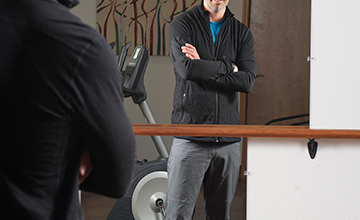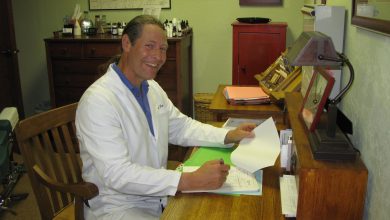In The Bedroom Project
 With Valentines Day right around the corner we find it timely to share a special interview we conducted with Susan Kay Preslar MS FNP-C and her In
With Valentines Day right around the corner we find it timely to share a special interview we conducted with Susan Kay Preslar MS FNP-C and her In
THE BEDROOM PROJECT.
Susan is a Family Nurse Practitioner with a specialty in Female Sexual Health. She has a Masters Degree from New York Medical College/Pace University, and her…
Preceptorship as a FNP was done at Harvard Community Health Plan in Cambridge, MA. She was an Associate Professor at SOU, and worked at the Health Center for 15 yrs as Assistant Director, and then Director. She left to start this specialty in Female Sexual Health. Susan has her clinical practice, in Medford at Ventana Wellness and a small home practice. She also has a coaching practice at the Sente Center in Ashland.
In the Bedroom… what a great title. How did you come up with this name for your work and what does it mean to you?
I owe the title “In THE Bedroom” to Shannon, a former receptionist at Southern Oregon Health and Wellness (now Ventana Wellness). In 2002 when I was asking all the staff for their ideas on possible titles for the classes, Shannon offered that. It was an immediate hit.
I owe the notion of “claiming” the bedroom to a newspaper clipping that I have held onto for about the past fifteen years (currently misplaced in a small white envelope). It was a question to a Dear Abby like columnist, and the question was from a woman who asked Abby, or whoever the columnist was. “What is all this about the bedroom. Isn’t it enough in a marriage to keep the house clean, cook a good meal, and make a home? Do we have to be good at sex too?” And the columnist response was a story from a women comedian: The gist of the story was that this woman on the first day of her marriage, said to her husband. “I can be good in one room of the house, I can’t be good in all the rooms. You can pick which room I specialize in”. He did, and she was seldom seen in the kitchen.
Susan, what typically inspires women to step forward and contact you? Are they needing to have a problem solved or can they just be looking to discover what the potential of their relationship is?
Usually a woman comes in when she has a problem and wants to make a change. In fact if a woman shows up in a medical office to talk about sexuality or she shows up in one of the “in the bedroom classes” I can pretty much assume that she is very motivated to create change. It takes a lot for women to show up at a medical office and talk about sexual problems either pain or lack of desire or lack of arousal or orgasm. Some women do come wanting to enhance sexual response or to ask questions about what’s possible. Usually, though, her concern is more problem oriented.When she first comes in we usually start in the physical arena and move on from there. There are many medications that take away desire and arousal in females. There are hormonal issues that make lubrication difficult, or there can be tight pelvic floor muscles. Very rarely, in my practice, is decreased sensation a neurological issue, almost always it is vascular or hormonal problem.
Are you also working with men and or couples to address these issues?
Men come in with women to the women’s medical visit perhaps 20% of the time. When they do come in it is mostly great. Men already have their YES for sex (not always). They may not do the relationship pieces well but they do hold the yes for sex quite strongly. 90% plus of the women who come in my office praise their man. They say their man is patient, understanding, supportive and willing to experiment. The women are distressed that they don’t feel what they used to feel, or distressed that they have never felt what they thought they could feel.
So far I have only done classes for women. Don’t get me wrong though, the man or the female partner is vitally important to success in the bedroom. I’ve gotten a lot of requests from the women to give the class to their men, and to include couples. I am getting brave enough that this spring in April or May I will do a class that includes men.
Normal is a great yet slippery concept. It is important for women to know what most women experience so that they know nothing is “wrong” with them. Reporting to them what is usual (“normal”) is helpful to do. I can tell you that having low desire is the number one complaint worldwide (Japan, England, Brazil, Mexico…) that women express about sex. It is common, ranging from 20 to 45% of all women. It is not just the woman in menopause, though it’s worse with menopause. I see women of all ages, in their 20s 30s 40s, and on up, coming in wondering why they’ve lost their desire, or wondering why they have never experienced sexual desire in the first place. One way to talk about desire is to talk about biological desire versus other kinds of desire. Research has shown that females that are menstruating experience desire midcycle for a few days when hormones peek at ovulation time and some women also report increased desire right before their periods. This desire is hormonally driven and it is what most women relate to when they talk to themselves about their own sexual desire. But there is also receptive desire. This is when they respond with interest to their partners or husbands approaches. Spontaneous desire or biological desire happens just a few days per month when the woman is initiating, when she “is on the prowl”. The rest of the time receptive desire takes place. In medicine the low desire classification is when both of these are missing. But women often come in looking for their spontaneous desire. They may still be receptive to their partner, but they’re wondering why they’re no longer thinking about sex, or initiating it.
After ovulation stops (Surgery or Menopause), or if you are on medication that impedes ovulation, there is a new landscape to navigate around desire. Many no longer care about sex, but often want to care. They do care about the relationship. Women experience this as a loss, sometimes devastating to them. There are successful ways to navigate through this.
The answer to low libido is only sometimes Testosterone. Having said that, I think low male hormones in a female is a very significant issue. Deficient androgens (male hormone) in a woman creates a loss in stamina and strength. It lowers optimism and can create depression; there is a sense of fatigue, and no impulse to have genital engagement. Genital sensations can be lowered. These women have an empty tank and they push themselves with their will to get through a day. I was in primary care for 20 yrs, and looking back I would now check androgen levels on each woman who came in complaining of fatigue or depression. If you miss the diagnosis of low androgens, that women will drag herself through life. Low libido in women is so frequent, only a small percentage of that, in my experience, is actually due to low testosterone.
My practice is often looking for that women’s YES for the enjoyment of SEX. I am looking physically, hormonally, energetically and psychologically. I am in a retrieval and discovery process .
You had mentioned that not knowing what one might like can also have an effect on ones interest in sex. Can you speak more to this?
Many women sit in my office and tell me that their partners and husbands want to please them. They want them to feel good and get excited. The women say that their husbands ask them “What is it that you like?” and the woman doesn’t know what to say. She is hoping maybe that he knows what she likes and can provide it. The question “What do you like” is confusing to the women, often. I have come to think of it as a muscle that has not been flexed enough by the women. The “What is it that you like?” muscle. “What feels good to you?” muscle. Many women say they have never asked themselves that question. Picking the music in the bedroom, or the lighting, or the timing, or asking for the right pressure of touch, is a way to start flexing that muscle.
Touch and intimacy can be negatively linked with sexual shame and the trauma of unwanted sexual encounters. This is all too common. With enough time and attention women can recover from this. There are excellent resources in the Rogue Valley for “getting above the healing line” as my good friend calls it.
I refer women, and also couples with ongoing issues, to counseling professionals. I also refer them to bodywork professionals to reestablish the safety of touch.
You had shared with me on the phone about women splitting her attention in the bedroom and how this might not necessarily serve the couple. Can you discuss this a little from a historical point and then take us in the bedroom with this?
Women have an effective and very well utilized gift and that gift is multitasking. It is a strength that you can see on display in every dentist office, convenience store, Girl Scout meeting or boardroom. It’s an incredible skill. Women can split their attention and track multiple things in multiple places all at the same time. In the bedroom this skill is a tremendous disservice to her own sensual experience. Her attention can be split and she can be tracking many things completely unrelated. Bringing her focus back to her body, and letting her give up multi-tasking for the time she is in the bedroom is a plus. She is then not thinking of the To-Do List, and the cobweb on the ceiling, and wondering what view her partner has of which of her body parts.
Techniques can work to change this attention pattern. There are some brief cognitive behavioral practices and mindful meditation techniques that can work here. I am working on a CD of exercises to help women let go of their multi-tasking while in the bedroom.
Tell us a little bit about why you work in groups of women to discuss sexual issues. What type of effect and benefit does this approach have?
I can share a view or some information on female sexuality one on one in my office, and it is helpful. But when I share that information in a group it takes me back by how much more powerful it is. Lets say I was sharing info about women and stress. I could say how most women do not feel sexual when under high stress, and often back away from sex when stressed. Men may see sex as a way to reduce stress and move towards it when there is tension. So right when the mortgage money is not there, and a kid has a 101 temperature, he is moving towards her, and she is retreating. When I say that out loud in the room and 12 other women in that room are nodding there heads, the women then gets it that she is normal. She is not odd, or alone in her experience. The notion that there is nothing “wrong” with her has landed. It lands much more strongly in the
group than when I say it to her individually. You can see the level of relaxation occur in the classes. Her confidence builds from that place of relaxation.
Many women will be reading this article. What is the one message you would want to share with them in understanding / utilizing your work?
If I were to tell women one thing I would tell them that It is possible to go from a ho hum or problematic sex life to a great one. I have seen it happen multiple times. I have seen a woman who was in a 24 yr marriage say that she and her husband “never did really have issues”, but that they “were never on the same page” and sex was “always a bit negative’. She went from being resentful of her husband’s enjoyment of sex, because she did not share it, to now longing for her husbands touch. “She likes even going to the hardware store with him now” she says. I have seen a 29 yr old mother of two experience sexual desire for the first time and rejoice. I have seen a woman who had not slept with her husband for the last five years of her 35 yr old marriage; describe their relationship now as one with spark and hunger.
Women are adept at waiting. Waiting until their partner figures them out, waiting until they lose those 20 lbs, waiting until the dishes are done, waiting to go into the bedroom with enthusiasm. I would tell them don’t wait.
The In The Bedroom Project is the collecting of these success stories of women who did not wait. They asked the questions, persisted, got examined, took classes. They turned a ho – hum or problematic sex life into one they call great. Whether it was through surgery, Tantric Study, Hormones, Energy work, Counseling or any combo or other reasons. In this project there is a preference for the transforming of sex lives within an existing relationship. “I changed partners” can be a real answer to the questions “What made your sex life great?”. It is the observation of this health care professional that often there are unopened doors within an existing relationship. It is in the context of having a positive supportive relationship but wondering if there is more possibility in the bedroom that this project lives.
Many men will also be reading this article. What is the one message you would want to share with them in understanding / utilizing your work?
First, I would tell men congratulations. From what I hear in my office is that mostly you are doing OK, and you are appreciated by your women.
Then I would say to men if you want to have your women be wonderful, warm and sometimes wild in bed you are going to have to get outside yourself and see what it is that actually works. For most men it won’t be what they think, nor what they would want to intuitively do. Women will respond to you if they are deeply noticed and appreciated. Many men do not really get this, as they can go on without needing ongoing attention but most women need to receive attention to relax and open, like watering a plant.
This concept comes from the work of Paul and Patty Richards and what they call “Wild Attraction”. The book “Wild Attraction” is available at Sound Peace, Bloomsbury’s and on Amazon.com and is the best articulation of gender dynamics. Patty and Paul live in Ashland, and Patty now gives the practical classes that complement the book. Call 541 482 –7182 to learn more about her classes.
How can improved sexual relationships create change and or effect ones place in society?
In my view improving sexual relationships changes society, and makes it stronger. When a woman’s sex life improves, she becomes happier and more relaxed. When she relaxes, her partner has more access to her, and he (or she) then is more relaxed. There is then more energy and strength available to the couple, more “joie de vivre”. The couple then has more energy for each other, and then more to share with their community. There is more energy available for coaching soccer or football, volunteering at schools, and working through differences.
The excitement in her eye and the blush on her cheek, and the satisfied puffed up chest of the man, is worth working towards. Personally I think there is a grace that sweeps into the world when this occurs. I think there are unknown possibilities for our communities when men and women embrace the strength and power of each other.
The next In The Bedroom Classes are:
Tuesday’s Feb16th and March 2nd in Yreka at Clarity Medical Spa 6:00 to 8:00 ($30 includes both evenings)
To register call (530) 842-3261Thursdays’ May 13th and May 20th in Medford at Ventana Wellness Conference Room 6:00 to 8:30 ($45 includes both evenings)
To register call (541) 494-1050Please Visit: Inthebedroomproject.com,




